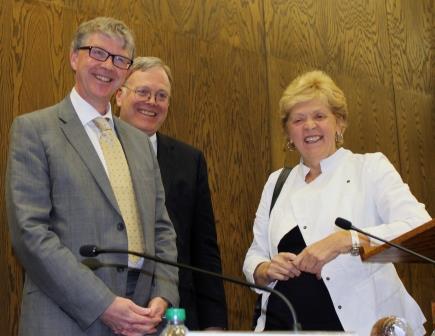Symposium 2013: Keynote Speakers

Delegates, invited guests, and listeners worldwide via live webcast of the opening session of the 20th Annual International Law and Religion Symposium were privileged to hear an excellent and stimulating keynote addresses by Judge Françoise Tulkens, and Professor Malcolm Evans OBE, who spoke to the topic Religion and Human Rights.
Those assembled in the Moot Court of the J. Reuben Clark Law School at Brigham Young University, as well as those listening in via live webcast, were first welcome by Law School Dean James R. Rasband. After which the speakers were introduced by W. Cole Durham, Jr., Director of the Law School’s Internation Center for Law and Religion Studies, the Symposium’s sponsoring organization, who also presented the Center’s Distinguished Service Award to Professor Evans.
Both Judge Tulkens and Professor Evans delivered compelling and provocative addresses.
Judge Tulkens spoke from her perspective as a former distinguished member, key player and Vice President, of the European Court of Human Rights, who brought “fine legal skills and great personal qualities. … passion, generosity, energy, sensitivity, charm, wisdom, sense of justice and unfaltering commitment to human rights.”
Professor Evans spoke from his perspective as an academic and Deputy Director of the Human Rights Implementation Centre (HRiC) within the University of Bristol School of Law and as a member of the UK Foreign Secretary’s Advisory Group on Human Rights and of the Organisation on Security and Cooperation in Europe’s Advisory Council of Freedom of Religion and Belief who has worked extensively with numerous international organizations on a broad range of human rights issues.
Judge Tulkens recounted concerns arising from the European Convention on Human Rights, identifying two aspects of the private right to freedom of thought, conscience, and religion guaranteed by Article 9 of the Convention: the external and the collective. The external aspect concerns public controversies, such as bans on wearing headscarves in public. The collective aspect deals with discrimination as covered by Article 14 of the Convention and other issues such as multiculturalism, which, as Tulkens stated, “has frequently proved challenging.” In dealing with these issues, the Court has frequently turned to a “necessity test,” asking if a pressing social need existed to accept certain behaviors. More recently, Tulkens explained, the Court has turned to solutions arising from “practical concordance,” where each side makes concessions, which she feels is a better solution.
Professor Evans shared his view that “questions of religion juxtaposed with anything else generate controversy.” Few other rights have converse questions, Evans noted, like “freedom of religion and freedom from religion.” But, Evans stated, freedom of religion and freedom of expression are “both foundational to democratic society,” and that many conflicts might be resolved if parties had a greater respect for each side. Evans asked, “Might respect be able to help us make sense of the human right of freedom of religion?”
The remarks of both speakers served as excellent foundation both for the discussions to take place in the following days.
With thanks to the BYU Law School News Team